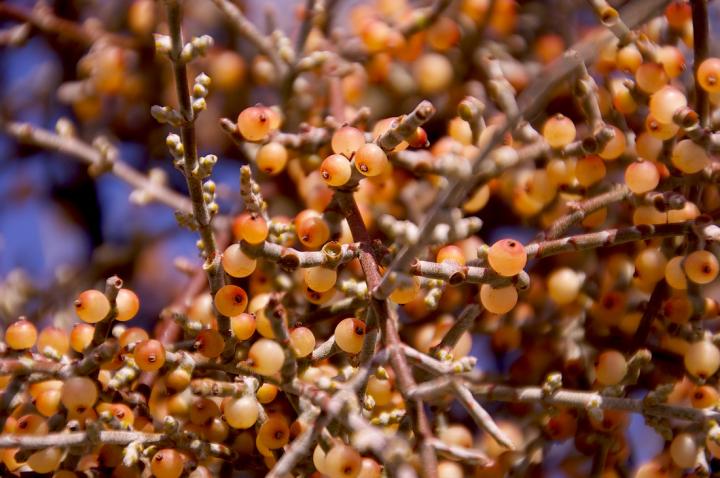Mistletoe sends treemail

Credit: Paul Nabity/UCR
The plant that encourages kissing at Christmas is in fact a parasite, and new research reveals mistletoe has an unusual feeding strategy.
Like other plants, mistletoe is capable of using sunlight to create its own food, a process called photosynthesis. However, it prefers to siphon water and nutrients from other trees and shrubs, using “false roots” to invade its hosts.
“Plants are autotrophic, they make their own food. Humans are heterotrophic, we eat it,” explained UC Riverside plant-insect ecologist Paul Nabity. “Mistletoe are mostly heterotrophic, but they can switch if they want to.”
Nabity’s team found when two mistletoes invade the same tree, they increase photosynthesis to get the nutrients they need, essentially sharing the tree and causing it less harm.
“They seem to know when they’re attacking the same host, and can reduce the virulence of their attack,” Nabity said.
A new paper describing this finding was published today in the journal Current Biology.
The Christmas mistletoe is a European species that tends to attack apple and other hardwood trees in central California. For this experiment, the researchers examined a native species of mistletoe found throughout the Sonoran and Mojave deserts that often grows on acacia, palo verde or mesquite trees.
When researchers removed one of two mistletoes from a branch, they saw the plant left behind did not increase its photosynthesis, and in some cases reduced its water intake.
“It appears that the remaining mistletoe recognized it was no longer competing for resources,” Nabity said.
Often times, birds feed from and guard a fruiting mistletoe and in the process, defecate seeds into the same tree from which they came. A tree full of related mistletoes increases the parasite load for the host, though the infection may not be as severe as it otherwise would be if infected with unrelated plants.
Nabity, who studies interactions between plants and insects, explained that communication among mistletoes is possible through a variety of methods. They are connected to a host’s xylem, the tissue that trees use to move water and nutrients from the roots. It’s possible the mistletoes send messages using the xylem. It’s also possible they may “smell” one another.
Plants produce chemical compounds and release them through their pores. These compounds evaporate quickly into the air, sending signals that can be received down wind.
However it is that mistletoes communicate, Nabity says they doesn’t necessarily need to be removed from infected trees.
Forest managers have long maintained that removal will increase tree health. Though this may be true for an individual tree, mistletoe has an important role ecologically, benefitting birds and pollinators. It tends to flower in winter when nectar or pollen from many other plants is not yet available.
Not only does mistletoe help other species, it may not hurt trees or shrubs as much as once feared.
“Don’t remove mistletoe because you think they’re all bad,” he said.
###
Media Contact
Jules Bernstein
[email protected]
Original Source
https:/
Related Journal Article
http://dx.




